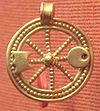
Abellio (also Abelio and Abelionni) was a god worshiped in the Garonne Valley in Gallia Aquitania (now southwest France), known primarily by a number of inscriptions which were discovered in Comminges, in the Pyrenees. He may have been a god of apple trees or the sun.
Origin and duties
Abellio is accounted for in two Roman inscriptions, one spelling the deity Abellio and the other Abelio.
Some scholars have postulated that Abellio is the same name as Apollo, who in Crete and elsewhere was called Abelios (Greek Αβέλιος), and by the Italians and some Dorians Apello, and that the deity is the same as the Gallic Apollo mentioned by Caesar, and also the same as the Belis or Belenus mentioned by Tertullian and Herodian.
Other scholars have taken the reverse position that Abellio might have been a similar solar deity of Celtic origin in Crete and the Pyrenees, but the Cretan Abellio may however not be the same god as the Celtic one, but rather a different manifestation, or dialectal form, of the Greek god Apollo or his name.
In his attempt to connect the Grail legends to the Cathars, Otto Rahn identified the worship of Abellio in the Pyrenees with the Latinized form of Belenus-Apollo whom he equated with Lucifer.
Though some scholars have tried to identify this god as Greek or Celtic, the fact is that the theonym Abellio is only attested among the Aquitani, a people neither Greek nor Celtic. There are three other attested Ballio names in the Roman Empire, all of them anthroponyms and without final N: one in South Italy, and two in Ancient Dalmatia.
References
- ^ Schmitz, Leonhard (1867), "Abellio", in Smith, William (ed.), Dictionary of Greek and Roman Biography and Mythology, vol. 1, p. 2, archived from the original on 2005-07-28, retrieved 2007-08-20
- Jordan, Michael (1993). Encyclopedia of gods : over 2,500 deities of the world. Internet Archive. New York : Facts on File. pp. 1. ISBN 9780816029099.
- Labrousse, Michel (1948). "Un Sanctuaire Rupestre Gallo-Romain dans les Pyrénées". Revue Archéologique. 31/32: 481–521. ISSN 0035-0737. JSTOR 41028715.
- Corpus Inscriptionum Latinarum (CIL) XIII, Pars Prima Aquitania 39, 40.
- Fest. s. v. Apellinem; Eustath. ad II. ii. 99
- Julius Caesar, Commentarii de Bello Gallico vi. 17
- Tertullian, Apologeticus 23
- Herodian viii. 3; comp. Capitol. Maoeimin. 22
- Rahn, Otto (2008-02-28). Lucifer's Court: A Heretic's Journey in Search of the Light Bringers. Simon and Schuster. ISBN 9781594777370.
- Rahn, Otto (2006-09-22). Crusade Against the Grail: The Struggle between the Cathars, the Templars, and the Church of Rome. Simon and Schuster. ISBN 9781594777219.
Other sources
- Ellis, Peter Berresford, Dictionary of Celtic Mythology(Oxford Paperback Reference), Oxford University Press, (1994): ISBN 0-19-508961-8
- Wood, Juliette, The Celts: Life, Myth, and Art, Thorsons Publishers (2002): ISBN 0-00-764059-5
- Proto-Celtic — English lexicon
External links
 Media related to Abellio (god) at Wikimedia Commons
Media related to Abellio (god) at Wikimedia Commons
![]() This article incorporates text from a publication now in the public domain: Smith, William, ed. (1870). "Abellio". Dictionary of Greek and Roman Biography and Mythology.
This article incorporates text from a publication now in the public domain: Smith, William, ed. (1870). "Abellio". Dictionary of Greek and Roman Biography and Mythology.
| Celtic mythology series | ||
|---|---|---|
| Ancient deities of Gaul, Britain and Gallaecia by region | ||
| Supra-regional |
|   |
| Britannia | ||
| Gallia Aquitania | ||
| Gallia Belgica | ||
| Gallia Celtica | ||
| Gallia Cisalpina | ||
| Gallia Narbonensis | ||
| Germania Inferior | ||
| Gallaecia | ||
This article relating to a Celtic myth or legend is a stub. You can help Misplaced Pages by expanding it. |